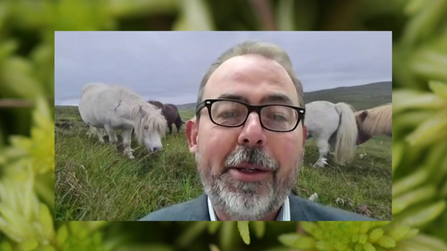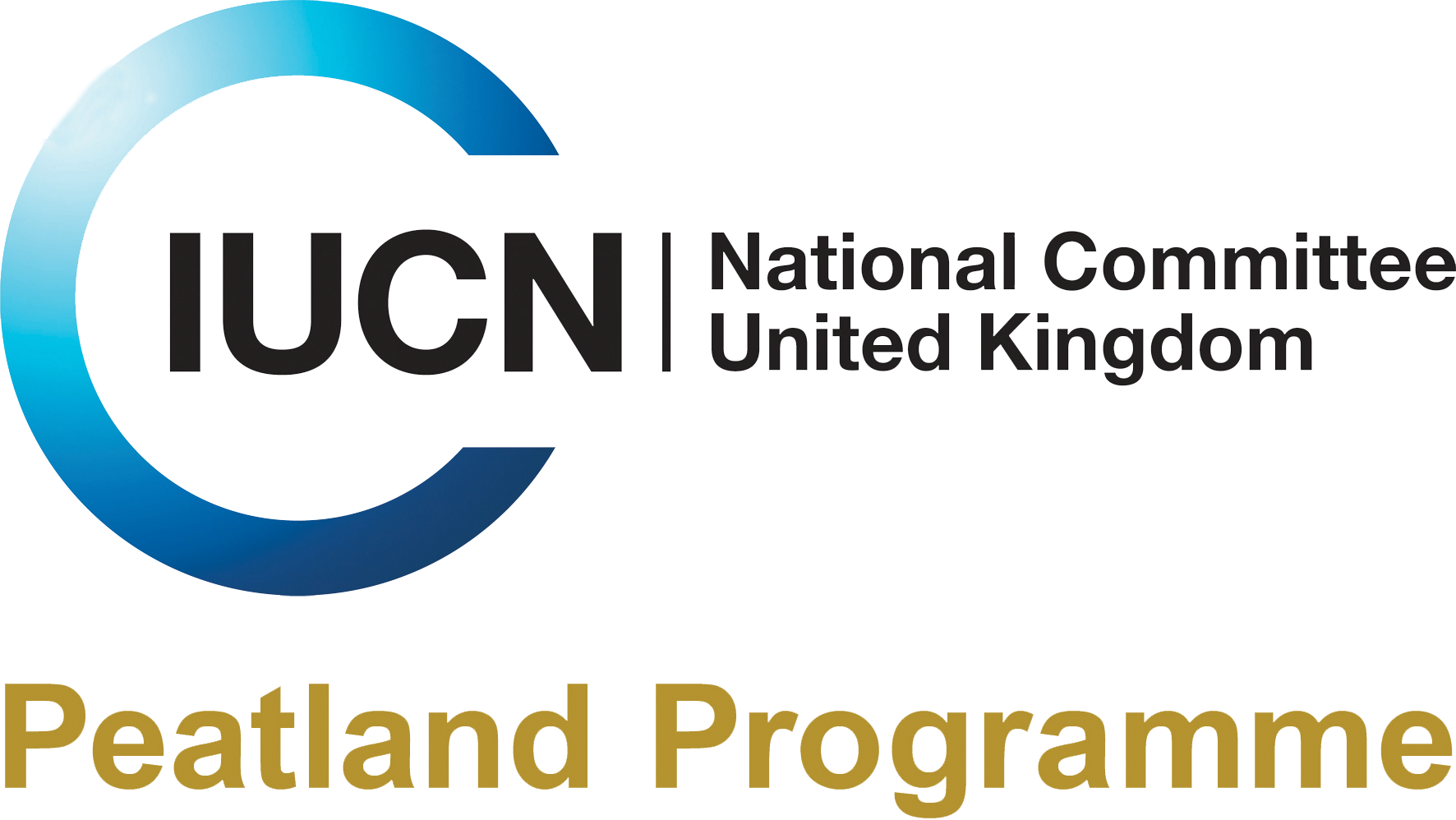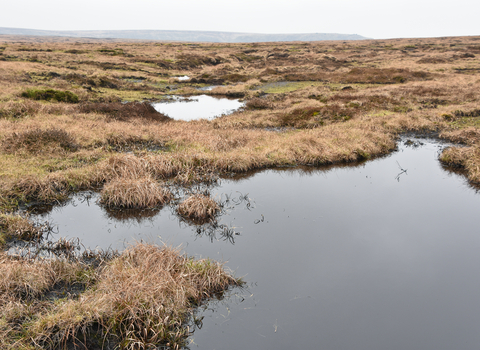The 11th IUCN UK Peatland Programme conference - ‘Peatlands in Partnership: a road to recovery' took place as a virtual event in September over four days and attracted over 470 delegates from across the globe. This year's theme brought a focus on peatlands and the people behind them, exploring peatland conversation, restoration and sustainable management in action as well as the partnerships, evidence, policy and practice driving progress towards the UK Peatland Strategy goals.
Daily networking opportunities (below) were highlighted in the Programme. Tuesday evening was host to a Peatland Film night featuring:
• Film premiere from Pennine PeatLIFE and Land & Sky Media Film showcasing peat restoration and the people behind it.
• Atlas - Official music video introduced by artist Sarah Smout for Yorkshire Wildlife Trust
• Film shorts from the British Mountaineering Association (BMC) introduced by Catherine Flitcroft, Access and Conservation Officer, BMC
• Peatland Protectors from MoorLIFE 2020 introduced by Jackie Wragg, Youth Engagement Officer, Moors for the Future Partnership

Day 1 talks
Day 1 sessions included progress towards UK Peatland Strategy goals, an international perspective and conservation of most readily recoverable peatlands.
Conference welcome including keynote address
Opening of the 2021 IUCN UK Peatland Programme Conference: 'Peatlands in partnership - the road to recovery'.
- Welcome to our 11th IUCN UK Peatland Programme Conference: Stuart Brooks (National Trust Scotland & IUCN UK National Committee)
- Keynote address: Craig Bennett (The Wildlife Trusts)
- An overview of the UK Peatland Strategy: Clifton Bain (IUCN UK Peatland Programme)
Progress towards UK Strategy goals
This session shared the four country updates on delivering the UK Peatland Strategy goals.
- England: Sophie Chapman (DEFRA, Natural England)
- Northern Ireland: Sara McGuckin (Northern Ireland Environment Agency, Natural Environment Division)
- Scotland: Eilidh Henry and Ben Dipper (Scottish Government); Andrew Coupar (NatureScot)
- Wales: Pete Jones (Natural Resource Wales)
Chaired by Clifton Bain (IUCN UK Peatland Programme)
Global peatlands, climate change and biodiversity
This session shared international peatland action in the UN Decade of Restoration, the role of peatlands as a nature-based solution and UK peatlands in the climate crisis.
- International peatland action in the UN Decade of Restoration: Dianna Kopansky (Global Peatlands Initiative, UNEP)
- The role of UK peatlands in climate mitigation: Stewart Maginnis (IUCN)
- The roles of UK peatlands in the climate crisis: Ian Crosher (Natural England)
Chaired by Stuart Brooks (National Trust Scotland & IUCN UK National Committee)
Conserving and enhancing the most readily recoverable peatlands
This session shared examples of work to conserve and enhance the most near natural & readily recoverable peatlands from across UK peatland habitats.
- Conserve, restore and enhance remnant peatlands - an overview: Iain Diack (Natural England)
- The Flow Country: Moving Towards UNESCO World Heritage Status: Steven Andrews (Highland Council)
- Conserving & enhancing fenland in Northern Ireland: Trish Fox (Ulster Wildlife Trust)
- Conserving & enhancing lowland raised bogs in Wales: Patrick Green (New LIFE for Welsh Raised Bogs)
Chaired by Andrew McBride (Land and Habitats)
Day 2 talks
Day 2 sessions looked at peatland partnerships in action including restoring heavily degraded areas towards functioning peatland ecosystems.
The role of peatlands and partnerships in landscape recovery
This session provided an introduction to the role of landscape and partnerships in peatland recovery including a keynote address.
- Welcome to Day 2 of the conference: Paul Leadbitter (North Pennines National Landscape)
- Keynote address: The EU LIFE fund made a difference for peatlands conservation and restoration in Europe: Sylvia Barova (EU LIFE Programme)
- The role of landscape in peatland recovery: Ruurd van Diggelen (University of Antwerp)
Building successful peatland partnerships
This session shared insight into the role of partnership working in delivering landscape scale peatland restoration with case studies from EU LIFE funded projects Pennine PeatLIFE and MoorLIFE2020 as well as reflections on how collaboration has led to consolidating a larger Great North Bog partnership. The session also explores the role of land manager engagement in building wider partnerships and developing the peat agenda within the Environment Agency.
- The continuous evolution of partnership working: Christopher Dean (Moors for the Future Partnership)
- Landscape scale peatland restoration in partnership: the Great North Bog: Tim Thom (Yorkshire Wildlife Trust)
- Building wider partnerships: land management engagement: Matt Scott-Campbell (Moors for the Future Partnership) and Alistair Lockett (North Pennines National Landscape)
- Developing the peat agenda within the Environment Agency: Katie Aspray and Katharine Birdsall (Environment Agency)
Chaired by Chris Woodley-Stewart (North Pennines National Landscape)
Peatland restoration in action
This session explored the necessity, existing principles and gaps associated with defining peatland restoration trajectories across different peatland habitats in the UK; establishing and assessing peatland restoration trajectories of blanket bog and results of restoration work from EU LIFE funded peatland projects.
- Defining restoration trajectories - necessity, existing principles and gaps: Richard Lindsay (University of East London and IUCN UK Peatland Programme)
- Establishing and assessing peatland restoration trajectories: blanket bog: Emma Shuttleworth (University of Manchester)
- Restoration in action: restoration results: Jenny Sharman (Yorkshire Wildlife Trust)
- Transitioning along the restoration trajectory: restoration results: Alistair Lockett (North Pennines National Landscape) and Chris Fry (Moors for the Future Partnership)
- Hydrology LIFE safeguarding peatlands and small water bodies in Finland: Eerika Tapio (Hydrology LIFE)
Chaired by Pete Jones (Natural Resources Wales)
Monitoring peatlands on a landscape scale
This session explored the use of UAVs in peatland monitoring, the role of peatland maping in accelerating peatland restoration in Northern Ireland and the peat mapping project across England.
- Landscape monitoring: UAVs: Ben Clutterbuck (Nottingham Trent University) and Adrian Yallop (Cranfield University)
- How useful are UAVs for monitoring peatlands? Chris Osborne (Yorkshire Wildlife Trust)
- Accelerating restoration: mapping peatland in NI: Matt Aitkenhead (James Hutton Institute) and Ian Garner (Ulster Wildlife Trust)
- Landscape scale peat mapping: England: Andrew Webb (Natural England)
Chaired by Kate Morley (Moors for the Future Partnership)
Peatland restoration: economics, financing mechanisms and carbon
This session shared an assessment of the economic value of peatland restoration in Northern Ireland and carbon assessment associated with the Peatland Code. It also explored the integration of other ecosystem system benefits within finance mechanisms, the carbon sequestration of recovering blanket bog and the potential to scale-up peatland restoration financing.
- Valuing our Peatlands: assessing the economic value of peatland restoration in Northern Ireland: Philip Carson (RSPB)
- Peatland Code carbon assessment: Andrew Stimson (North Pennines National Landscape)
- Peatland Code and ecosystem service markets: Renée Kerkvliet-Hermans (IUCN UK Peatland Programme)
- Carbon sequestration from blanket bog restoration: Fred Worrall (Durham University)
- Carbon sequestration of recovering blanket bog: Chris Evans (UK Centre for Ecology & Hydrology)
- Scaling-up peatland restoration financing: Dan Hird (Triodos Bank)
Chaired by Tim Thom (Yorkshire Wildlife Trust)
Day 3 talks
Day 3 explored adaptive peatland management, regenerative agriculture, wetter ways of farming and peat-free progress.
An introduction to wetter ways of farming and why it matters
This session provided an introduction to wetter ways of farming including lucrative, innovative and achievable examples from across the globe; paludiculture as wetter ways of farming and an overview of GHG emissions from UK lowland peatlands.
- Welcome to Day 3 of the conference: Olly Watts (RSPB)
- Keynote address: Hans Schutten (Wetlands International)
- Adaptive peatland management: paludiculture as wetter way of farming - overview & diversity: Jan Peters (Succow Foundation Griefswald Mire Centre)
- Overview of GHG emissions from UK lowland peatlands: Ross Morrison (UK Centre for Ecology & Hydrology)
Adaptive management in action: Innovation, adaptation & diversification
This session shared examples of wetter ways of farming in action including: an introduction to wet agriculture in the UK; developing a landscape vision at Store Vildmose; the need for agricultural adaptation in the UK; examples of UK trials and a demonstration for climate friendly building materials.
- Paludiculture as a stepping stone between rewetting and conventional agriculture: Barver Moor: Harry Mach (Broads Authority)
- Creating a new approach to peatland ecosystems: Andrea Kelly (Broads Authority)
- Developing a landscape vision – Store Vildmose: Peter Hahn (Naturstyrelsen (Danish Nature Agency))
- The need for change in the UK: Ross Taylor (Buffaload)
- UK trials and opportunities: WaterWorks project: Kate Carver and Lorna Parker (Wildlife Trust for Bedfordshire, Cambridgeshire & Northamptonshire)
- A House in the Mire: Paludi-tiny house - a demonstrator for climate friendly building materials: Anke Nordt (Griefswald Mire Centre)
Chaired by Sarah Proctor (IUCN UK Peatland Programme)
Reintroduction of Sphagnum moss and its potential as a climate crop
This session explore the importance of Sphagnum moss in the fight against climate change and shared results from the re-introduction of Sphagnum as part of peatland restoration works as all as results from carbon farming trials. It also shared experience of rethinking farmed lowland peat.
- Importance of Sphagnum in the fight against climate change: Andrew Davidson and Dr Neal Wright (BeadaMoss)
- Re-introducing Sphagnum - trials from LIFE: Tia Crouch and Jemma Benson (Moors for the Future Partnership)
- Carbon farming - results from Care Peat: Anna Keightley (Manchester Metropolitan University)
- Reverse Coal - rethinking farmed lowland peat: James Brown (Pollybell Farm)
Chaired by Sarah Johnson (Lancashire Wildlife Trust)
Peat & Horticulture: Demonstrating success
This session provided an update on the diversity of solutions engaging with the peat-free campaign plus view from industry.
- Peat-free horticulture: a need for action: Jenny Hawley (Plantlife)
- Non-peat materials in commercial substrates: Paul Alexander (Bulrush Horticulture)
- Industry action on growing media: David Denny (Horticultural Trades Association)
- How does industry gear up for new long term sustainable industry avoiding fragility of relying on a single product: Steve Harper (Southern Trident)
- Progress in peat-free horticulture: Mark Gush (Royal Horticultural Society)
- The Wildlife Trusts 'Peat-free' Survey: Ali Morse (The Wildlife Trusts)
- Grass Roots Actions: For Peat Sake: Diane Sammons (For Peat Sake)
Chaired by Niall Ó Brolcháin (National University of Ireland, Galway)
Day 4 talks
Day 4 sessions explored sustainable peatland management: conserving and rehabilitating peatlands so that they function fully does not mean that these areas become off-limits to economic activity.
Sustainable peatland management in action
This session explored the sustainable management of peat soils followed by examples of sustainable peatland management across Yorkshire Water, the Outer Hebrides and the South West of England.
- Welcome to Day 4 of the conference: Rachael Bice (Yorkshire Wildlife Trust)
- Keynote address: Sustainable management of peat soils: Jordan Stanley (Defra) and Robert Caudwell
- Sustainable peatland management across Yorkshire Water: Andrew Walker (Yorkshire Water)
- Sustainable peatland management on the Outer Hebrides: Benjamin Inglis-Grant (Carloway Estate Trust, Peatland Action, NatureScot)
- Sustainable peatland management in South West England: Morag Angus (South West Peatland Partnership)
Chaired by Rachel Bice (Yorkshire Wildlife Trust)
Risks to sustainable peatland conservation and management
This session explored risks to delivering sustainable management including overlooking the historic environment; the role of finance for payment for public goods and the risks and opportunities associated with competing land use including forestry and renewable energy.
- Forgetting about the historic environment - sustainability and archaeology: Ben Gearey (University College Cork)
- Blended finance driving private investment in peatlands: Brendan Turvey (NatureScot) and Naomi Oakley (Natural England)
- Competing land use: renewable resources - forestry: Clifton Bain (IUCN UK Peatland Programme)
- Windfarms and peatland issues for planning: Louise Guniston (RSPB)
- Peatlands and windfarms: Peter Robson (ScottishPower Renewables)
Peatlands, climate change, adaptation and risk management
This session explored the climate change risks to peatlands in the UK as well as the role of peatlands in risk management associated with wild fires, natural flood management and slope stability.
- Climate change risks to peatlands in the UK: Kathryn Brown (The Wildlife Trusts)
- How does land management influence FIre REsiliences and carbon fate in BLANKET bogs? The FIREBLANKET Project: Roxane Andersen (University of the Highlands and Islands)
- Collating an evidence base for wildfires across the South Pennine Moors SAC: Chris Fry and Paul Titterton (Moors for the Future Partnership)
- Risk management - natural flood management: Julie Foley (Environment Agency)
- Risk management - slope stability: Richard Lindsay (University of East London)
Chaired by Sarah Proctor (IUCN UK Peatland Programme
Continuing on the road to recovery - COP26 and COP15 peatland positioning
This session shared a motivational round-up of international action for peatlands including positioning peatlands at COP26 and COP15.
- Sandeep Sangupta (IUCN)
- Tobias Salathe (The Ramsar Convention on Wetlands of International Importance)
- Hans Schutten (Wetlands International)
- Hans Joosten (Griefswald University)
- Dianna Kopansky (Global Peatlands Initiative, UNEP)
Our annual conference series present opportunities for policy makers, scientists, land managers and practitioners from different disciplines to share their knowledge, experience and enthusiasm of peatland conservation and management.
The 2021 IUCN UK Peatland Programme conference was brought to you in partnership with Pennine PeatLIFE; LIFE; Moors for the Future Partnership.
It was kindly sponsored by: Master Pile

